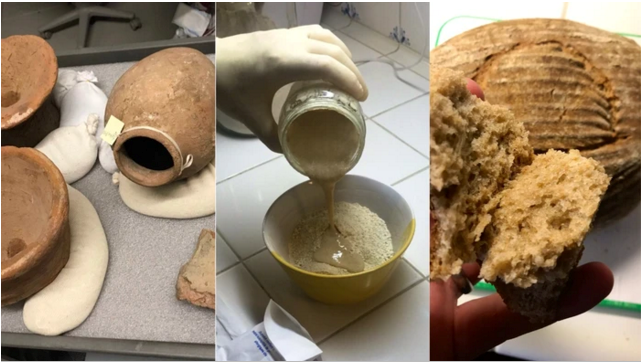Photo: KAMUT® (Khorasan) Sourdough Bread / Breadtopia
Have you ever wondered what Egyptians ate in 1500 B.C.? I was surprised to learn that the Egyptians savored sourdough bread as a vital part of their healthy diet. The National Sourdough Bread Day, which takes place every April 1st, is the perfect occasion to talk about bread -especially sourdough- being a staple food in many ancient cultures and even today.
Sourdough is a method generally used by bakers to prepare bread through the fermentation of dough, using naturally occurring bacteria (lactobacilli) and yeast. As its name suggests, sourdough bread tastes more acidic than bread made with commercial yeast due to the lactic acid produced by the lactobacilli. Sourdough is made up of “starter” that should be added while making the dough, which helps in growing the yeast and lactobacilli in the flour, and provides additional flavor and texture to bread. Using the right portions of sourdough starter and dough will make the difference when preparing great tasting bread.
During the California Gold Rush in the mid-1800s, French bakers brought the techniques of sourdough to San Francisco, which eventually became a signature food of Californian culture and even a tourism attraction. In recent years, the sourdough bread phenomenon has reached new levels. In 2019, the physicist and creator of Xbox, Seamus Blackley, was able to extract yeast from ancient Egyptian pottery – and with the help and guidance of a microbiologist and an archaeologist- used that ancient yeast to replicate the bread eaten by the ancient Egyptians. He chronicled the fascinating venture on Twitter.

Some of the steps in Seamus Blackley’s study recreating sourdough bread from ancient Egyptian yeast.
Sourdough bread has become a favorite food not only because of its long history and great taste but also due to its benefits in protecting the digestive system because, among other things, it promotes the growth of healthy gut bacteria. Sourdough is rich in vitamins such as B1-B6, B12, folate, thiamin, niacin, riboflavin, vitamin E, selenium, iron, manganese, calcium, magnesium, phosphorus, zinc and potassium and also contains several important proteins, probiotics, and fiber. Studies have shown that sourdough bread, unlike other types of bread, is beneficial for people with diabetes because of its positive effect on blood sugar and insulin levels.
According to Dr. Shilpa Ravella, a gastroenterologist and professor of medicine at Columbia University Medical Center, fermented food and drink – like sourdough bread – help people to maintain a healthy gut by activating the trillions of healthy bacteria when combined with the right foods. However, Dr. Ravella notes that it is important to keep in mind that not all fermented products are made equally: “Yogurt is a beneficial food, for example, but some brands add too much sugar and not enough beneficial bacteria that the yogurt may not actually help.”
Brands like KAMUT® khorasan wheat that can be used to make sourdough bread, are good options for those with digestive issues, wheat sensitivities, and many other dietary restrictions. KAMUT® khorasan wheat is an ancient grain, guaranteed under the KAMUT® khorasan wheat, to never be hybridized or genetically modified, is always organically grown, and is prized for its nutrition, ease of digestibility, sweet nutty- buttery taste and firm texture. KAMUT® khorasan wheat is grown on certified organic farms primarily in the Northern Great Plains of North America where the dry climate similar to its origins ensures the best quality is consistently obtained.
KAMUT® khorasan wheat can be stored in sealed containers in cool, dark locations or kept fresh in the refrigerator. At home, it can come in handy in recipes for pancakes, salads, porridge, bread (of course), pasta, soups, and even pizza! Although people with celiac disease (about 1% of the population) should avoid wheat products containing gluten, most people with non-celiac wheat sensitivities (up to 20% of the population) do not need to avoid the consumption of ancient grains. In fact, because most people with sensitivities to modern wheat are able to eat KAMUT® khorasan wheat with no difficulty, it is an excellent alternative to modern wheat.
In the words of Bob Quinn, founder of KAMUT International, there is an inseparable connection between food and health, “food should be our medicine and our medicine should be our food.” Happy National Sourdough Bread Day!
 Food
Food Farmers
Farmers Sustainable Living
Sustainable Living Living Planet
Living Planet News
News